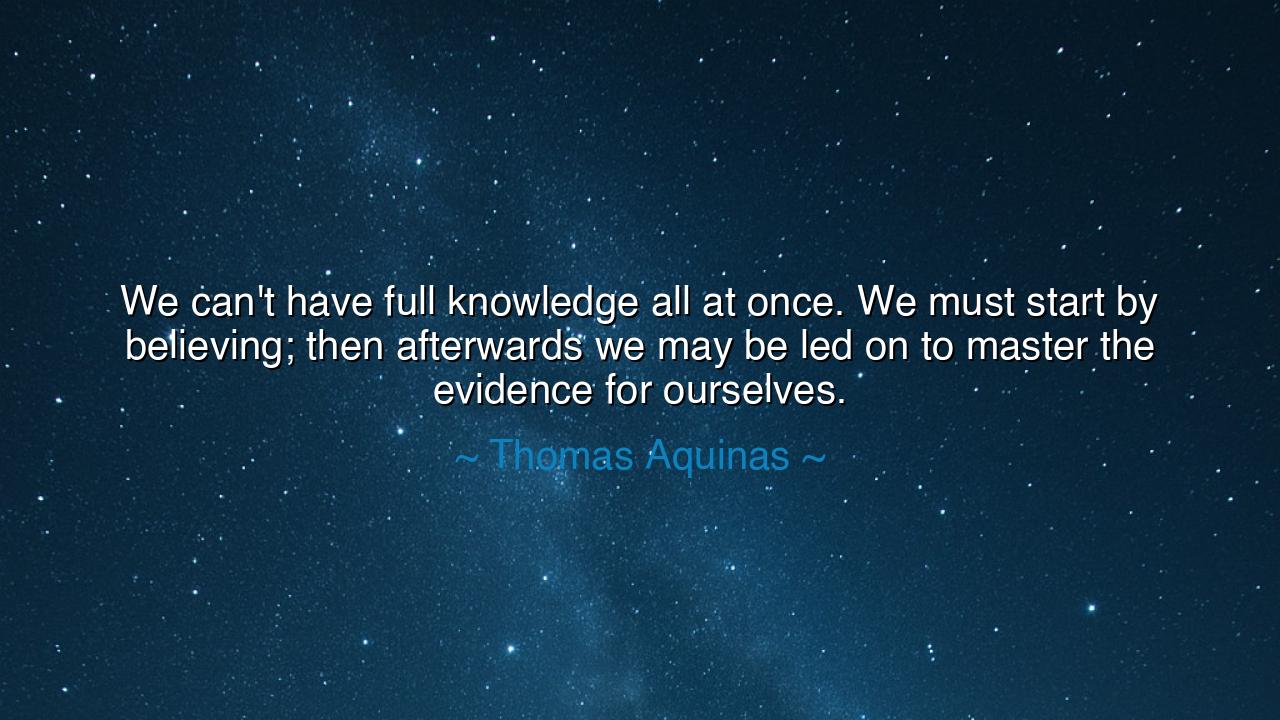
We can't have full knowledge all at once. We must start by
We can't have full knowledge all at once. We must start by believing; then afterwards we may be led on to master the evidence for ourselves.






The words of Thomas Aquinas, the Angelic Doctor of the Church, shine with humility and eternal wisdom: “We can’t have full knowledge all at once. We must start by believing; then afterwards we may be led on to master the evidence for ourselves.” In these words, Aquinas reveals the journey of the human soul toward truth. Knowledge does not descend in a single stroke of lightning; it dawns like the sun, first as faith in what we cannot yet prove, and then as clear sight once we are ready to bear the light.
The origin of this saying lies in Aquinas’s vast work as both theologian and philosopher. Living in the thirteenth century, he stood at the crossroads of faith and reason. The universities of his time were filled with arguments about God, nature, and man, and Aquinas saw that students could not be given full knowledge instantly. Instead, they had to begin with trust—belief in the wisdom passed down from faith, mentors, and tradition. Then, with patience, discipline, and study, they could examine the evidence and make it their own. He knew that the mind must grow step by step, as a child first learns to trust the parent before understanding the reasons behind each instruction.
History itself confirms this truth. Consider the voyage of Christopher Columbus. Before he set sail across an unknown ocean, he could not have absolute knowledge of what lay beyond. He began instead with belief—belief in maps, rumors, and his own conviction. Only after braving the sea did he gather the evidence of new lands. Though flawed in many ways, his journey illustrates the principle that belief must often precede knowledge; it is the seed of action that later yields evidence. Without belief, no voyage is begun; without evidence, no voyage is confirmed.
Or reflect on the path of scientific discovery. Galileo did not begin with absolute knowledge of celestial mechanics; he began with belief in the power of observation. By turning his telescope to the heavens, he trusted that truth was there to be found, and only later did the evidence of Jupiter’s moons confirm his vision. The same can be said of Newton, who believed that the apple’s fall and the moon’s orbit were linked before he mastered the mathematics to prove it. All great knowledge begins with the courage to believe.
O seekers of truth, understand this: to demand perfect knowledge before taking the first step is to remain forever unmoved. If the farmer waited for absolute proof of harvest before planting the seed, no field would ever bear fruit. If the student waited for complete mastery before beginning study, no mind would ever be enlightened. Belief is the bridge between ignorance and knowledge—it is the trust that moves us forward until the light of evidence shines clear.
The lesson is clear. Do not scorn belief as weakness, for it is the soil from which understanding grows. But do not remain in belief alone; walk onward until you master the evidence and make truth your own. Believe first in your teachers, in your parents, in the wisdom of ages, but do not stop there. Test what you have been given, explore, seek, and confirm. For the soul that begins with belief and ends with knowledge has walked the full path of wisdom.
Practical action lies before you: when faced with the unknown, begin with trust. Believe in the possibility of truth, in the guidance of those wiser than yourself, and in the light that lies ahead. Then study diligently, reflect deeply, and pursue the evidence until your belief is transformed into conviction. This is the path of every scientist, philosopher, and seeker of God: to begin in belief, to continue in study, and to arrive at knowledge.
Thus let Aquinas’s words echo across time: “We can’t have full knowledge all at once. We must start by believing; then afterwards we may be led on to master the evidence for ourselves.” Hold them close, for they are a map of learning itself. Trust, begin, and walk forward with patience, for truth does not reveal itself to the impatient, but only to those who believe enough to begin the journey.






AAdministratorAdministrator
Welcome, honored guests. Please leave a comment, we will respond soon